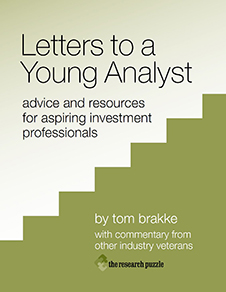
- Monday, September 8th, 2014
- never delegate understanding
-
Charles and Ray Eames were a legendary husband-and-wife design team, best known for their furniture, but creative and relentless in their pursuit of excellence no matter the endeavor.Eames Office | This site details the breadth of their work. Charles famously summarized their hands-on approach with a three-word mantra: “Never delegate understanding.”
In the world of investments, that’s a hard standard to meet.
Everywhere you look, understanding is being delegated. Individuals hope and expect that the advisors that they use have the investment chops to make good decisions and the ethical fiber to deal honestly with any potential conflicts of interest. But the clients don’t normally understand the details of their investments — and can’t really assess the competency of the advisor either.
And consider those advisors. They have many different aspects of their jobs and, according to surveys, they spend very little time on investment analysis. That means that they need to delegate that to others as well.
In a big organization, they may be able to lean on in-house experts. An advisor might deal with them directly on some matters, but usually the information is delivered via asset allocation models, lists of recommended vehicles, and periodic reports. A small firm or a solo practitioner is in more of a bind, although similar services can be cobbled together with some effort and expense via outside vendors and publicly-available sources.
The advisors are in effect aggregating the analysis of others, serving as conduits of information for their clients. That raises some questions: What are the responsibilities of the advisors? If they are delegating the work, how can they expect to understand the nuances of the recommendations that they are providing to the client? How much should they understand about the decision processes used by those upon whom they rely?
Or think of a small institutional entity, let’s say a charity with a volunteer board and a stretched staff. Those involved have a fiduciary duty to uphold in regard to the handling of the organization’s funds, so they hire an advisor of some sort and delegate most everything. The advisor, in turn, will likely delegate much of it too, including to asset managers who are completely unaware of the purpose (or even existence) of the charity’s funds.
Actually, larger institutions also have similar challenges (including well-known ones with sophisticated members on their investment committees). They face a delegation problem as well.
“All of this is to be expected,” you might say, “since it doesn’t make a lot of sense for everyone to become an expert in everything.” Delegating important responsibilities to those best able to do the work seems reasonable.
But delegating understanding is different than delegating work.
Does the ultimate analysis/recommendation/action, taken by an agent (maybe thrice or more removed from an asset owner) fit in the context of the investment beliefs that were intended to guide the process? Are decisions being motivated by incentives that don’t match those of the asset owner (and aren’t even on the radar screen)? Are they being obscured by complexity and a lack of transparency?
And, at each link in the chain of responsibility, is proper due diligence being conducted? As I wrote somewhere else recently, “throughout the investment world, actual due diligence significantly lags marketed/presumed due diligence.” In one sense, that’s not surprising, since due diligence is time-consuming, expensive, and difficult. Nevertheless, it represents the great weakness in all of this delegating.
And that weakness is usually unseen until the proverbial stuff hits the fan. Before that, it is assumed that everything is running smoothly, that the work is being done, and that the due diligence process is as thorough as you would hope. How would you know if it wasn’t?
Don’t assume. Understand.
